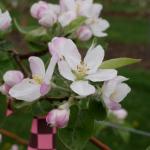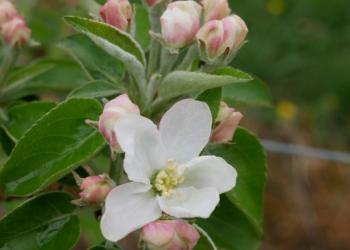Fruit Program News
-
Annual Summer Meeting of the Massachusetts Fruit Growers' Assoc. - July 11
July 1, 2017Annual Summer Meeting of the Massachusetts Fruit Growers’ Association
in cooperation with University of Massachusetts Fruit Program
TUESDAY, July 11, 2017
Cider Hill Farm
45 Fern Avenue, Amesbury, Massachusetts10:00 AM Welcome to Cider Hill Farm and the morning tour -- Glenn Cook, President, MFGA
10:15 AM Orchard TourBlueberry and raspberry plantings
Primocane blackberry patch
Seedless grape planting
Fruit-tree spacings and preferences
New planting of cider apples
Renewable energy program (solar, small turbines, and high efficiency wood boilers)
Tomato greenhouses
Day neutral strawberry high tunnel trial
insect and disease control updates/IPM strategies for tree and small fruit (Jon Clements and Sonia Schloemann)NOON Lunch by Goody Coles BBQ provided with the registration charge
1:15 PM Welcome to the afternoon tour -- Glenn Cook, President, MFGA
1:20 PM Facilities TourBrand new hard cider venture
CSA, food truck, and fledgling jam factory
Labor profile2:30 PM Adjourn
Registration for this meeting will be $25 for Mass. Fruit Growers’ Association members ($35 for non-members) per person and will include the tour, educational program, pesticide recertification credits, and lunch.
To ensure the availability of the meal, please pre-register by adding the appropriate number and type (member or non-member) registrations to your shopping cart and paying with a credit card.
We must receive pre-registrations by Friday, July 7 to assure availability of the lunch.
PDF version of this announcement -- print and register via US Mail.
Register on-line by July 7 using PayPal and a credit card here...
-
2017 SWD Insecticide Recommendations for Small Fruit and Stone Fruit
June 21, 2017 -
Current bud stages updated
May 15, 2017Current bud stages updated have been updated on 15-May, 2017 http://ag.umass.edu/fruit/resources/bud-stages-photos
-
Eco Apple app now available
May 7, 2017 -
May fruit twilight/thinning meetings scheduled
May 2, 2017
May fruit twilight/thinning meetings have been scheduled. These will be important meetings for you to attend after a heavy bloom to see what your apple chemical thinning options will be. Dr. Duane Greene will attend with chemical thinning recommendations. Hope to see you there!10-May, 2017 (Wednesday) Fruit Twilight/Thinning meeting, 5:30 PM. Honey Pot Hill Orchards, 138 Sudbury Road, Stow, MA. http://www.honeypothill.com/ 1 pesticide credit will be offered. $20 admission. Light supper will be served. Contact: Jon Clements, 413-478-7219. Pre-registration is not necessary.
11-May, 2017 (Thursday) Fruit Twilight/Thinning meeting, 5:30 PM. UMass Cold Spring Orchard, 391 Sabin Street, Belchertown, MA. http://coldspringorchard.com/ 1 pesticide credit will be offered. $20 admission. Light supper will be served. Contact: Jon Clements, 413-478-7219. Pre-registration is not necessary.
-
Orchard bud stage photos updated...
May 1, 2017Orchard bud stage photos have been updated...taken at the UMass Cold Spring Orchard, Belchertown, MA.
-
NEW Fact Sheet: Crop load guide for young apple trees
April 26, 2017Crop load management on young apple trees is important to balance fruit load with vegetative growth so that "runting out" or biennial bearing does not happen. This is important with varieties such as Honeycrisp (in particular) that are prone to "runt out" and/or go into biennial bearing if over-cropped in the early orchard establishment years. See the NEW Fact Sheet Crop load guide for young apple trees for more information and guidance on cropping young apple trees.
-
Apple Orchard Management Decisions in 2017: Take Advantage of Technology
March 29, 2017 -
UMass RIMpro Advisory Service 2017
March 22, 2017 -
Climate, Weather and Apples publication
February 15, 2017






